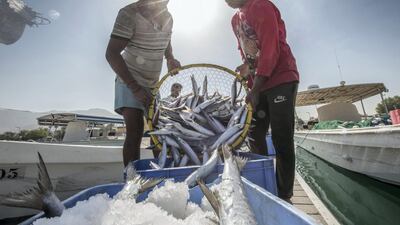The UAE has issued a call to arms to help restore the country’s depleted fish stocks.
A sweeping initiative announced on Wednesday aims to reverse the rapid decline in fish species, enhance local fish-farming and rebuild denuded habitats.
New legislation, tougher enforcement and tighter scrutiny of the commercial, recreational and spearfishing communities all come under the scope of the 12-year plan that seeks to harness the power of federal agencies, environment bodies and the public to play their part in improving the UAE's marine environments.
The intervention was unveiled by the Environment Agency-Abu Dhabi and the Ministry of Climate Change and Environment on the second day of the World Ocean Summit.
Thani Al Zeyoudi, Minister of Climate Change and Environment, hailed the new framework as monumental step towards boosting the country’s marine life.
“We are facing a two-fold challenge. First, we are working to sustain our fisheries and allow them to replenish. At the same time, we have the responsibility of meeting the growing market demand for fish,” said Mr Al Zeyoudi. “This monumental step for our nation will enable us to preserve our long-standing fishing tradition for years to come."
The move by the UAE’s environmental leaders is timely. Fish species are declining because of climate change, desalination, coastal development, degradation of habitats, pollution and rising demand for fish. The problem is exacerbated by illegal fishing, the use of banned gear, the catching of prohibited species, flouting laws on fish size limits and unreported catches through recreational fishing.
Wednesday's move also builds on the agency's 2018 fisheries survey that painted a sober outlook for the future of the country's fish species, with more than 85 per cent of the UAE's sheri and hammour populations wiped out. Only a few days ago, the agency banned the use of gargoors, a traditional type of fishing cage that targets threatened species.
“The situation is clearly severe," said Ahmed Al Hashmi, acting executive director, terrestrial and marine biodiversity sector, at the EAD. "Certain legislation has not been updated since 2002. So some will be changed, some made stricter and others clarified.”
The first survey, that shed light on the UAE's fish populations, took place in 1978 and showed about five tonnes of fish per every square kilometre. “The question we’ve always asked is: how much fish do we have?” he said. By 2002, this had dropped to less than a tonne. “Then the alarms started so we introduced stricter rules on permits, regulations on fishing gear and declared protected areas. But those trends are the same today,” said Mr Al Hashmi. “Therefore we have launched the framework today.”
The plan also encompasses the surging numbers of recreational and spearfishing enthusiasts. Thousands of new recreational permits were issued in Abu Dhabi last year alone and there is a lack of awareness among these people about how to fish in a sustainable way.
“You have a normal guy with a line from the coast and then someone who goes out on a boat. How do you deal with each one,” asked Mr Al Hashmi.
“There needs to be specific rules matching what each person is doing and ensuring they are targeting proper species and adhering to limits. There are many gaps which need to be addressed.”
Turning to the expanding spearfishing community, he said the agency had held workshops and intended to introduce rules on where this practice is allowed, what species can be taken and at what lengths fish can be caught at. "What about endangered fish. Should we ban fishing for these? All this is being discussed and a new spearfishing draft rule will be published soon," he said.
"We are working with people, communities, the private sector and places such as diving centres. We want to engage them in the drafting of new policies. Because in the end it will be implemented on them."
More details about the 12-year framework is expected to be announced in the next few months.

